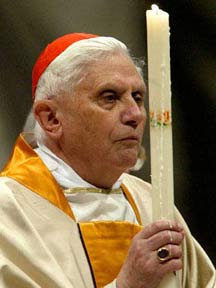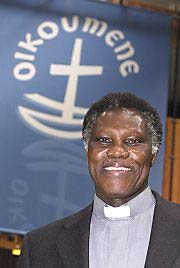

Pope Benedict
XVI plans to make Christian unity his 'primary task', especially with the
Orthodox Church. Benedict made the comments in a meeting with the Rev. Samuel
Kobia, the leader of the World Council of Churches, the fellowship of more
than 300 churches from nearly all Christian traditions, including Protestants
and the Orthodox. The Roman Catholic Church is not a member, but cooperates
with the WCC.
In his remarks, Benedict repeated his pledge that his "primary task"
as pope would be to work tirelessly to rebuild unity of all Christians with
"concrete gestures" and not just words. "The commitment of
the Catholic Church to the search for Christian unity is irreversible,"
Benedict said.
Samuel Kobia, Chairman of WCC, also stressed the importance of unity, saying faith "is more effective and vibrant when it is lived out together with our brothers and sisters in Christ." He said he greatly appreciated Benedict's commitment to ecumenism and invited the pope to visit the World Council of Churches in Geneva.
In Turkey, the spiritual leader of the world's Orthodox Christians, Ecumenical Patriarch Bartholomew II, welcomed Benedict's remarks in a written response to questions from The Associated Press.
"Such rapprochement
— what Pope Benedict XVI called 'spiritual ecumenism' — is our
obligation to God and our commitment to the world," Bartholomew said
in the statement. "At the same time, we must be realistic about the cost
and the time involved in this
process."
Bartholomew said efforts toward reconciliation wouldn't be easy and would require the churches to examine theological differences and "the errors of the past."
"The genuine
work of unity is slow and painful, and it must be treated with sensitivity
to theological truths, honesty before historical events, and realism in the
face of cultural distinctions.
This is why reconciliation can only blossom when there is sincerity and continuity
in this delicate process of healing," Bartholomew wrote.
In an interview
with the AP ahead of the papal audience, Kobia said he was hoping for progress
in one area in particular that has vexed some Protestant members of the World
Council. The issue stems from a 2000 document from the Vatican's Congregation
for the Doctrine of the Faith, which was headed by the pope when he was Cardinal
Joseph
Ratzinger.
The document, "Dominus Iesus," which Ratzinger signed, framed the role of the Catholic Church in human salvation in an exclusive manner. It suggested that non-Catholic "ecclesiastical communities" were "not churches in the proper sense."
"There are many Protestant churches that are members of the WCC and are concerned that they are defined as 'ecclesiastic communities' and not full churches," Kobia said.
He said he wasn't looking for Benedict to renounce the 2000 document, but said he hoped the two sides could "move beyond it."
"I would seek understanding that in order to progress on unity, it would be important to speak another language, moving beyond what has been said," he said.
Kobia referred indirectly to the issue in his remarks to Benedict, who was a member of a joint Catholic-World Council commission on faith from 1968-75.
Kobia said Orthodox members of the World Council of Churches are asked to reflect on whether there was "space" for other churches in Orthodox doctrine.
"Responses to these fundamental ecclesiological questions will certainly affect whether or not our member churches recognize each other's baptism, as well as their ability or inability to recognize one another as churches," Kobia said.
He said he encouraged discussion on the topic within the World Council "but also in our relationships with all our ecumenical partners."
Benedict has emphasized his pledge to ecumenism on several occasions in his nearly 2-month-old papacy. In his first homily as pope, on April 20, he said his "primary" task would be to work tirelessly to unify all followers of Christ.
He repeated that pledge May 29 in Italy's Adriatic seaport of Bari — a pilgrimage site for many Russian Orthodox — and called on ordinary Catholics to also take up the ecumenical cause.
Tensions between
the Catholic and Orthodox churches have focused on charges by some Orthodox
that the Catholic Church is encroaching on its territory. The rift prevented
the late Pope John Paul II from fulfilling a long-held wish to visit Russia,
the world's most
populous Orthodox nation.
